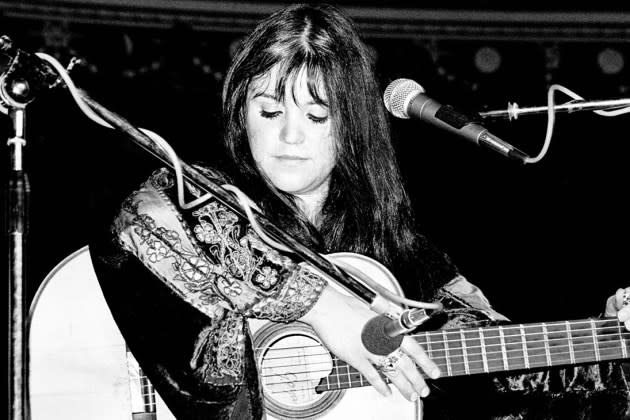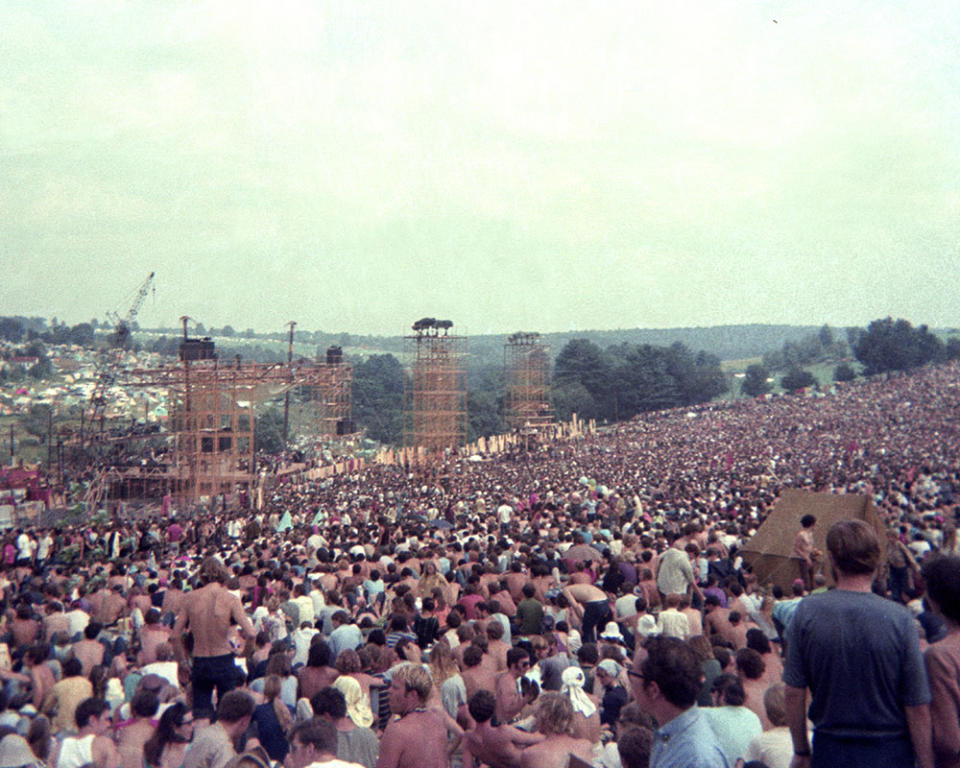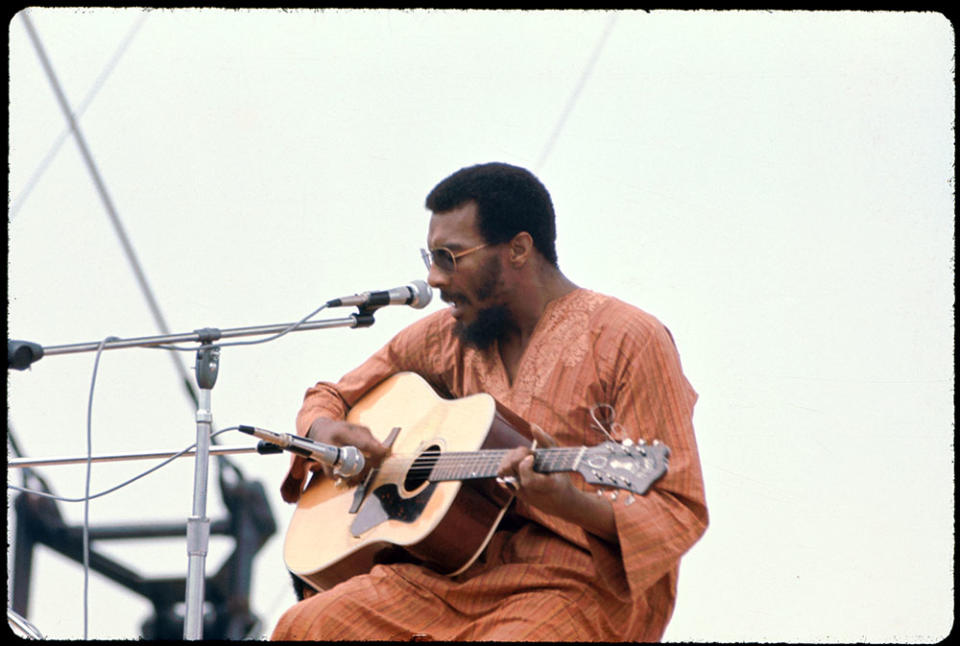Late Folk Legend Melanie on Her “Terrifying” Woodstock Breakout: “It Was Like Being Fed to the Lions”
- Oops!Something went wrong.Please try again later.

As the 50th anniversary of Woodstock approached, in 2019, I set out to find Melanie, the folk singer who shot to prominence in the late 1960s. I was curious to know how someone once so famous — known so widely that a first name alone would do — could now be so, well, not famous? Watching an early appearance of Melanie on The Tonight Show with Johnny Carson only left me more intrigued about her ambivalent relationship toward fame: How could the same person be so confident and charismatic behind a guitar, but so diffident and uncomfortable chatting with Carson? I reached her by phone in Nashville, where she graciously reminisced on her Fellini-esque beginnings in Europe, and the out-of-body experience that changed everything for her: her solo performance on the first day of the Woodstock music festival, August 15, 1969. “I thought this is the end of my life.” In fact, it was just the beginning. The below account is drawn from our conversation that day. It would be one of her final interviews: Melanie died on Jan. 23 at age 76. — Joseph Fenity
***
Nineteen sixty-eight is the year where things were starting to happen for me, especially in Europe. I had a major hit in France with a song from my first album called “Bo Bo’s Party.” (It never made it anywhere else.) I did a showcase in England with Rod Stewart. (He wasn’t the Rod Stewart yet; he was in a group called The Faces.) And I was in the studio with the London Symphony Orchestra and the Rolling Stones were next door. It was really wonderful. It was creative and exciting.
More from The Hollywood Reporter
Nashville DA Drops Charges Against Country Star Chris Young Following Arrest at Bar
Justin Timberlake Reveals Upcoming World Tour on 'Tonight Show'
It was unreal because at home I was completely unknown. It was all so glitzy-showbiz in Europe with those variety shows of the time. In fact, for one month I was at the Olympia theater in Paris. I was second on the bill to Gilbert Bécaud, who was like the Frank Sinatra of Europe. They called him “Monsieur 100,000 Volts,” and he would come into my dressing room every night and say, “Melanie, you’ve gotta get the audience and you’ve gotta fuck ‘em!” It was like I was in a crazy Fellini movie — I shared my dressing room with a camel. It was part of the Arabian acrobats’ act, and they went on towards the beginning. It was a very nice dressing room, because I was second on the bill, but there was nowhere else to keep the camel.
Around that time, my producer (and future husband), Peter Schekeryk, learned that Woodstock was being organized for the following year. He says, “You should come. Three days of peace, love, and music! And there’s going to be crafts.” And I thought, “Oh, this sounds really good. I’d really like to be there.” I was picturing people getting together and shopping.
There was just no hype or buildup that had reached England about it yet. This is all before instant communication. So, I got home to New York, my mother picked me up and we stayed at her house overnight. Then she drove me up to Woodstock, and I had no clue yet what was going to happen. I don’t know if maybe we didn’t turn on the radio — I don’t know what it was. But we didn’t know. We were just driving and we were hitting traffic and thinking, “Well, it’s a weekend, there’s probably an accident ahead or something.”
The traffic was really bad. I knew that I was involved in something big because when we were like 40 miles from the site, we stopped at a motel in Bethel, New York, to call somebody. I get out of the car in front of this motel, and there’s Sly Stone and Janis Joplin and these are big stars. And I had never really met a big star.
And, of course, this is back in the U.S., where I live. Here I am in upstate New York, and it’s real life. This isn’t France with the girls dressed in feathers, and the camel and “Monsieur 100,000 Volts.”
I go into the lobby and I’m thinking, “Oh, my God, what is this?” And somebody recognized me and said, “Melanie, Melanie! Get to the helicopter!” I said, “What?” I’m just going with the momentum, and he’s running ahead and we’re running after him. We get to the helicopter, and he says, “Who’s she?” I say, “My mother.” And they say, “No — no, mom. Sorry, mom, goodbye mom. This is only for performers and musicians and managers.” I didn’t have the experience, the savvy, to say, “Oh, yeah — she’s my bass player!”
I never saw my mother again that day. I got into the helicopter. I didn’t even know when I was over that field — I didn’t even know what I was seeing down there — looked like some crazy crop of some sort. It was just these little balls of colors. The pilot had to tell me, “That’s people.”

How could people take up that much space? And then he pointed out the stage — which was like the size of a football field. It was starting to hit me. I was a person who sang and wrote songs and I had done this in rooms with music-business people. I had done this in front of lots of coffee house-like places, but not much else. Nothing like this.
They take me to a little tent. For some reason, I didn’t have an artist/backstage pass; but things were not that organized. When the gates came down and people started rushing in, it became crazy.
When I landed, Richie Havens was singing. I think he was in his, like, 40th minute of “Sometimes I Feel Like a Motherless Child.” And I knew Richie Havens — he was like the Pope of Greenwich Village at the time — and he had a unique style. And I knew he was terrified. I could hear it in his voice. There was this passion that could only come from complete and sheer terror. Or maybe he was ecstatic. It was daylight and very hard to command a crowd of 500,000 people. Half of them had just broken down a fence. And he’s singing, and they’re into it.

I assumed I was going to be on next, and that’s why they rushed me in with a helicopter. I didn’t even know what I was going to do. I didn’t have a set list. I knew I was in for it. I thought, “How can I possibly do this?” I had nothing — nothing — just me and a guitar. And I knew three chords. I did a lot with these three chords. I implied great percussion with these three chords. I implied symphonic orchestrations with these three chords.
And I had the voice — I had such a powerful voice. I would sing in the streets of Greenwich Village and there’d be a couple of hundred people there within a few minutes. Because if my voice wasn’t pretty, it was really loud. I wasn’t known in the States at all. I had just one record, called “Beautiful People,” that had become a “turntable hit.” That means the radio stations are playing it, but the music industry hadn’t caught up with the want and need for what was being played. Clive Davis did not get “Beautiful People” at all — and he all but shelved the project. But the record just had its own life. So that was the only thing I had that maybe a small percent of the audience who were New Yorkers might have heard. So I decided I would start off with that song. But that was it — I didn’t see how I could possibly pull this off. To me, this was just like being fed to the lions.
Somebody came up and said, “OK, you’re next.” And I take a deep breath, and I got nauseous, really — the nerves just kicked in. I developed this deep bronchial cough. And then the guy came back, and said, “Never mind.” So this is how the day went. Every act would go on, and then someone would come in and say, “You’re next.” And then sometimes they would come back and say, “You’re not.” And sometimes I’d just hear somebody else, and know it wasn’t me.
I didn’t go on until like 9 or 10 at night after Ravi Shankar. Now it was raining, and I’m thinking, people are gonna start to go home now, right? I mean, this is the first day. So nobody knew what was about to happen, nobody knew this was gonna be in the realm of myth. This is in the realms of myth. I certainly didn’t. I thought, “Oh, it’s raining. They’re gonna go home. And I’ll be saved, and I won’t have to go up there. Thank you. God. Yes. There is a God. Oh, I am saved, I am saved. I’m saved.” And right in the middle of that, they came in and said, “You’re next.” Only this time it was real.
And I had to go out there, and I was so finished. I had cried. I had thrown up, and I had taken a pot of tea from Joan Baez. This was my Woodstock moment. Joan Baez was my hero. She was what I wanted to be. I wasn’t serious enough. I was much too whimsical and playful and much too pretty. And I had a deep and gravelly voice. And I’d never make it to be Joan Baez. But she was my hero. She sent over an assistant — this girl came over and said, “Joan heard you coughing and thought you might like this.”
I don’t even know if she’d remember that she did this. But to me, this was like the act of kindness that probably got me through the rest of the day.
Before I went on, Wavy Gravy [the emcee] had passed around candles and said something inspirational about keeping candles lit. The moment that I got on stage, this candle lighting procession started. It started way back in the field, high up, and by now it was night. I just got to see the hillside light up and flicker, of course, because it was raining — how did they even keep them alive? The flickering lights coming toward me is an image that I have in my head that will never go away. And all of these circumstances probably were the catalyst to my whole career in America. Because I was forever associated with the lighting of things at concerts. It became the inspiration for my song, “Lay Down (Candles in the Rain).”
Onstage, I had an out-of-body experience. It is somewhat wonderful and somewhat terrifying to realize that you are not your body. And I was not on drugs. I took nothing. I was like this purist vegetarian person. I would never let smoke into my throat. Of any kind. And so I was completely sober, a straight, non-meddled-with person, experiencing this with not even a drink of whiskey. Completely vulnerable. And to deal with the terror — I mean, I thought this was the end of my life — my spirit left my body. I watched myself get on stage. I watched myself sit down.
It was all quiet. Silent. Like I wasn’t there. I didn’t hear. And then at some point I was singing “Beautiful People.” I was back in my body and I was singing to 500,000 people, and somehow resonated with them instantaneously. And I really owe everything to that moment because, I mean, it was a personal epiphany for me — it was something that will never go away. I understood the whole reason for my existence. Woodstock for me was totally magic.
This account has been edited for length and clarity.
Best of The Hollywood Reporter

